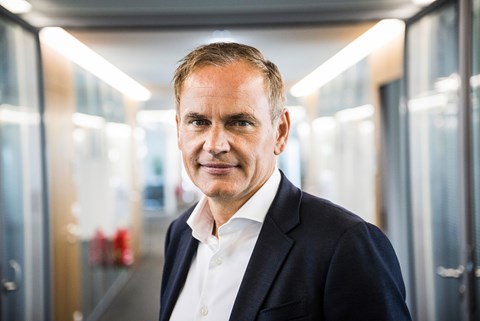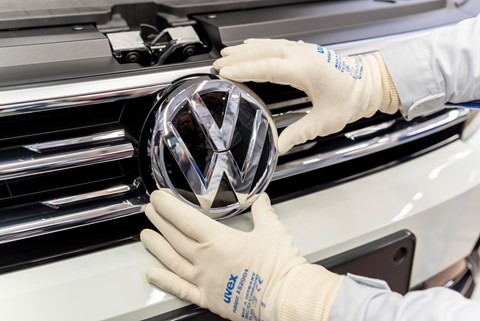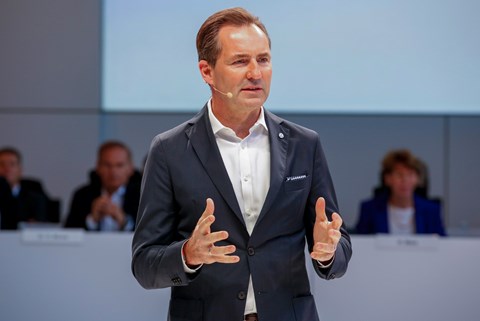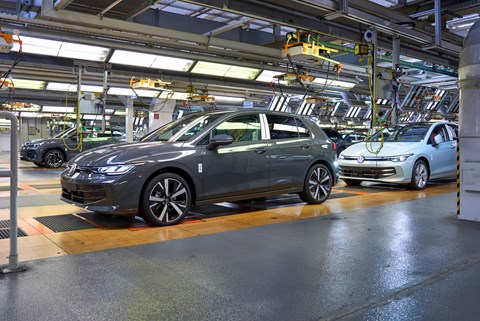► ‘Zukunft Volkswagen’ plan agreed by unions and Group
► Combustion Golf 8.5 production to move to Mexico
► Dresden facility to halt production at end of 2025
After Volkswagen Group announced it had ‘one, maybe two’ years to turn its ailing fortunes around in the middle of 2024, the business has come to an agreement with its Works Council and the IG Metall union and has put in place a series of plans designed to save billions of Euros per year.
Among a range of sweeping cuts, readjustments and cost savings, the Group’s ‘Zukinft Volkswagen’ plan has come after critical and sometimes fiery negotiations with its workers and unions.
The biggest news among the changes is that a symbol of German engineering prowess, the VW Golf, will have its production moved from the VW brand’s Wolfsburg home factory to its Puebla facility in Mexico from 2027.

‘Following the long and intensive negotiations, the agreement is an important signal for the future viability of the Volkswagen brand, Volkswagen Commercial Vehicles and the component plants. With the package of measures that has been agreed, the company has set a decisive course for its future in terms of costs, capacities and structures,’ says Oliver Blume, VW Group CEO (pictured above). ‘We are now back in a position to successfully shape our own destiny. The Board of Management and the wider management team are making a greater than proportional financial contribution.’
Why has Volkswagen Group needed to make savings?
Less demand and a slower electrification transition than initially thought are the primary reasons, as well as increasing pressures from new brands arriving from China, are cited as to why some European car makers’ fortunes are shaky of late. Certain brands are even changing stances on electrification; Audi, for example, is introducing more combustion-powered models than originally planned and Volvo relaxing its plan to be EV-only by 2030. Others are knocking back their planned number of EV sales by certain dates.
‘The market is just not there,’ said VW Group chief financial officer Arno Antlitz in front of around 25,000 workers at Volkswagen’s Wolfsburg facility in September 2024, according to Reuters. Volkswagen is reportedly facing a loss of demand of around 500,000 cars – a figure Antlitz says is equivalent to around two factories-worth of output.
Volkswagen AG CEO, Oliver Blume, added in September 2024 that ‘there are no more cheques coming from China,’ pointing to Volkswagen losing its sales lead in the country.

The comments during the meeting were met with resistance and protests from employees, with VW Works Council head, Daniela Cavallo, stating that management has ‘massively damaged trust.’ Cavallo pointed to a recent deal between Volkswagen and Rivian to develop software, urging management to explain why that circa £3.8bn investment is more important than German plant workers.
Another issue is labour costs. Given Volkswagen has so many of its facilities in its home country where wages for manufacturing labour are extremely high, it means the Group has the highest labour costs among many of its closest competitors. Volkswagen Group spent 15.4 per cent of its revenue on labour in 2023, compared to 12.7 per cent of Porsche, 10.9 per cent for Mercedes-Benz, 10.1 per cent for Stellantis and 9.5 per cent for BMW Group.
What is Zukunft Volkswagen and what was agreed?
The Zukunft Volkswagen (Future Volkswagen) plan is the agreed set of initiatives between the board of management and employee representatives on the future strategy of the group.
‘We have set ourselves three priorities for the future of the Volkswagen brand: Reduce overcapacity in Germany, reduce labour costs and achieve competitive development costs. The negotiations have led to viable results in all three areas. With the agreed package of measures, we are in a position to largely close the gap in our performance programme,’ says Volkswagen passenger cars CEO, Thomas Schäfer (pictured below).

In the statement regarding the plan, Volkswagen says that production capacity will be reduced by around 734,000 units in its German facilities, adding that it is ‘responding to the decreasing automotive market in Europe and the increasingly fierce competition, while at the same time creating the fundamental requirements for continued commercially viable production at its home base in Germany.’
While that doesn’t mean immediate plant closures, the wider plans do affect Germany’s various production sites and its employees in the medium to long-term future.
What will happen to Volkswagen’s factories and workers?
The plan is designed to reduce labour costs by around €1.5bn per year. Volkswagen says that the new agreement will ‘provide job security for the workforce of Volkswagen AG at the collectively agreed level until the end of 2030, as agreed during the collective bargaining negotiations. To this end, the company and Works Council have agreed on a socially responsible reduction in the workforce of more than 35,000 across Volkswagen’s German sites by 2030, alongside the structural production measures.’
Wolfsburg, Volkswagen’s home plant and major industrial hub, will undergo a series of changes. Chief among which, mentioned at the start, is the entire production of the Volkswagen Golf hatchback and Estate will be moved out in 2027. While the Golf has always been built in various plants around the world since its launch in 1974, this marks the first time the perennial VW car will not be built in its home country since its inception.

To replace it, ID.3 production will be moved out of VW’s Zwickau facility and moved into Wolfsburg, as well as the Cupra Born. Production lines will be reduced to two, instead of the current four. Volkswagen does say, however, that its ninth-generation Golf, which will be electric, will be built at Wolfsburg.
Around 4000 jobs will be cut by 2030 within the Group’s ‘Technical Development’ team, which is also based at Wolfsburg. The Group says those remaining will focus on the entire brand portfolio’s development and not just Volkswagen’s.
Given Zwickau will have ID.3 and Cupra Born production taken away, its sole manufacturing line from 2027 will be Audi’s Q4 e-Tron. VW says that ‘new business areas are to be developed in the context of the circular economy,’ to keep the factory afloat.
Dresden’s ‘Transparent Factory’ fares worse. It, too, was building the ID.3, and was even labelled the ‘Home of ID’ by VW. Even so, Volkswagen says it intends to discontinue vehicle production there at the end of 2025, adding that the Group is ‘working on alternative options,’ including ‘the possibility of Volkswagen AG participating in a third-party scheme.’
Over at Emden, production of the ID.4, ID.7 and ID.7 Tourer will continue, but there’s no mention of the ID.5. Slow sales and a disappointed reception of the coupe SUV could lead to its cancellation.
For Osnabrück, Volkswagen confirms it will continue to produce the T-Roc Cabriolet there ‘until mid-2027.’ After that, the Group says that ‘options for a different use of the site are currently being explored.’